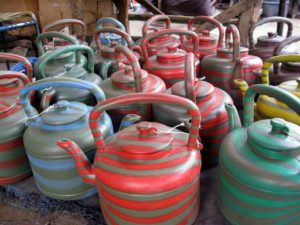As Ghanaians prepare to live with the deadly coronavirus, the Spokesperson for the National Chief Imam, Sheikh Aremeyaw Shaibu, has made a strong case for Muslims not to share ablution kettles.
He urged all Muslims to refrain from sharing the same plastic kettles, popularly known as ‘buuta’, to help curtail the spread of the novel coronavirus (COVID-19).
According to him, all Muslim communities must start practising the new directive at home and mosques, when the ban on social gathering is eventually lifted.
Before prayers, Muslims perform a ritual called ablutions or Wudu, which is to physically clean oneself using water-containing plastic kettles normally kept at the mosque or home.

In an interview on Onua FM, monitored by thegahanreport.com, Sheikh Aremeyaw urged all Muslims to endeavour to have individual ‘buutas’.
“As we all have individual buuta in our homes, let’s replicate the same at the various mosques, in protecting ourselves from contracting the virus, and in the end infecting the family and colleagues.”
He underscored the need to adhere to frequent washing of hands, wearing of nose masks and all other protocols put out by World Health Organization (WHO) and Ghana Health Service (GHS) in enhancing the fight against Covid-19.
The Islamic cleric noted that Muslims would be compelled to attend prayers at the mosque with prayer rug or prayer mat, as part of measures to contain the spread of Covid-19, should ban on public gatherings be lifted.
Leadership, according to him, would instruct all Imams at the community level to provide sanitisers and other personal protective equipment (PPEs) at mosques.
He admitted that Covid-19 and its associated restrictions hugely affected activities during the Ramadan and Eid ul-Fitr celebrations, since individuals were prohibited from congregating at mosques during the Salat period.
He, however, said lessons were being learnt and they would go a long way towards strengthening the way of worship.
Sheikh Aremeyaw entreated Muslims and the general public to observe all state protocols in reducing the spread of the virus.
















